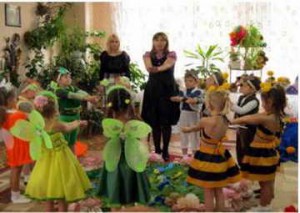 Environmental aspects have been included into the structure of Russian pre-school education since 1980s. Humans are considered as a part of the nature that should not harm the whole and the necessity of forming environmental consciousness, an ecologically literate and responsible person is emphasizing.
Environmental aspects have been included into the structure of Russian pre-school education since 1980s. Humans are considered as a part of the nature that should not harm the whole and the necessity of forming environmental consciousness, an ecologically literate and responsible person is emphasizing.
Such approach, at least at the formal level, is supported by the Russian government. Scientific society also notices transition to biocentrism inside the system of Russian environmental education. The rejection of utilitarian attitude toward the environment, for its turn, can not be realized effectively without including into the structure of the educational process environmental ethics ideas.
However there can be noticed some kind of inefficiency on the basis of a carried in this research analysis of four Russian preschool educational programs (“Origins”, 1997, psychological and pedagogical team of the Center “Preschool childhood” named after A. Zaporozhets, “Childhood”, 1991, the staff of the preschool pedagogy department of the Institute of Childhood of the Herzen State University for the Humanities, “Young Ecologist” 1993, S. Nikolaeva, “Our house is nature”, 1996, N. Ryzhova) in forming an environmentally responsible person. First of all, it was found out that in the modern Russian environmental education special stresses are laid on the theoretical information from different sciences and that hides ethical aspects.
This situation is corresponding to a tradition that was started in the 18th century but it does not always help to form an environmental consciousness – the environment can still be apprehended as just a resource. Secondly, even in the contents of two of the above-mentioned educational programs – and this programs are the leading ones in ecological pre-school education; they were created in 1990s and the majority of children was guided by them – elements of anthropocentric approach can be found.
In the third one, the mention of environmental literacy is superficial and is more a formality, and there is a probability that ethical ideas will be lost among the natural science information in the fourth one. Thus, it should be noted that the modern system of preschool environmental education needs a certain kind of transformation in order to correspond to the changes that take place in the field of environmental protection.
Created by Kichigina Polina

Thank you for another great article. just wanted to throw you a big thanks – you and I’ll bookmark it and come back later